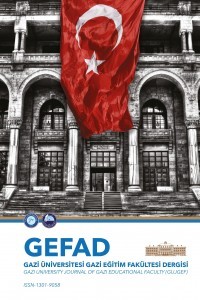Propaganda Posterlerinde Savaş ve Barış Temasının İşlenişi Üzerine Öğrenci Görüşleri
Propaganda, Propaganda posterleri, Savaş, Barış, Tarih eğitimi.
The Views of Students Related to War and Peace Theme at Propaganda Posters
Propaganda, Propaganda posters, War, Peace, History education.,
___
- Acar, K. (2004). Resimlerler Rusya, savaşlar ve Türkler. Ankara: Nobel.
- Allen, R. F. (1994). Posters as historical documents (A resource for the teaching of twentieth-century history), The Social Studies, 85(2), 52-61.
- Aulich, J., & Hewitt, J. (2007). Seduction or instruction? First World War Posters in Britain and Europe, Manchester University Press: Manchester and New York.
- Carty, T. (2008). World War I Posters; Thinking critically about history and the media, Middle Level Learning 30, National Council Council, pp. M9-M15.
- Ginzburg, C. “Your Country Needs You” A case study in political iconography, History Workshop Journal, Oxfort University Press,.1-22, www.jstor.org/stable/4289745 adresinden 10/05/2010 tarihinde ulaşıldı.
- Glass, C. (1919). Practical patriotism in American art. Art&life, 10(6), 294-297.
- Hakvoort, İ. (1997). Interview-Manual (Semi structured interview-procedure to assess the conceptions of peace, war, and strategies to attain peace, January, Department of Developmental Psychology, Faculty of Psychology, University of Amsterdam: The Netherlands
- Hakvoort, İ. (1997). Coding-Manual (Conception of peace, war, and strategies to attain peace), January, Department of Developmental Psychology, Faculty of Psychology, University of Amsterdam: The Netherlands.
- Hiley, N. (1997). Kitchener wants you and dady, what did you do in the Great War? The myth of British recruiting posters, Imperial War Museum Review,11, 40.58.
- Mahaney, D. C. (2002). Propaganda posters, OAH Magazine of History, 16(3), 41-46. www. Jstor.org/stable/25163525., 31/08/2010 tarihinde ulaşıldı.
- Levstik, L., & Keith, B. (2008). Doing history (Third Edition). Newyork-London: Routledge.
- Nation, Posters and Slogans (1917). 104 (2712), 728.
- Paret, P., Irwin B., & Paret, P. (1992). Persuasive Images (Poster of war and Revuluation),Princeton University Press: Princeton-New Jersey.
- Petrone, K. (1994). Family, Masculinity, and Heroism in Russian War Posters Of the First World War. In B Melman (Eds). Borderlines: Genders and identities in war and peace, 1870-1930 (41-52). Routledge: New York –London.
- Petrone, K. (2008). Motherland calling? National symbol and mobilazition for war, Journal of Peace Research, 28(2), 161-174.
- Porter, E. (1926). Student opinion on war. A dissertation submitted to the faculty of the graduate school of arts and literature in candidacy for the degree of doctoral of philosophy, Deparment of practical theology in the graduate divinity school: Chicago, Illinois.
- Rider, M. M. (1983). Images of propaganda: Worl War I and World War II Posters, Queen City Heritage, The Journal of The Cincinnati Historical Society, 41(1), 31- 36.
- Shover, M. J. (1975). Roles and images in World War I propaganda. Politics & Society, 5, 469-486. http://pas.sagepub.com at UNIV OF KENTUCKY adresinden 21 Mayıs 2010 tarihinde indirilmiştir.
- Stralding, R. (2003). 20. Yüzyil Avrupa tarihi nasil öğretilmeli, (Çev. Ayfer Ünal) İstanbul: Türkiye Ekonomik ve Toplumsal Tarih Vakfı.
- Yıldırım, A. ve Şimşek, H. (2006). Sosyal bilimlerde nitel araştırma yöntemleri. Ankara: Seçkin. http://www.hoover.org/library-and-archives/collections/posters.
- ISSN: 1301-9058
- Yayın Aralığı: Yılda 3 Sayı
- Başlangıç: 1985
- Yayıncı: Gazi Üniversitesi
Beden Eğitimi Öğretmenlerinin Farklı Değişkenler Açısından İş Doyumu Düzeylerinin İncelenmesi
İlköğretim 5. Sınıf Öğrencilerinin Çevreye Yönelik Tutumlarının Belirlenmesi
Fizik Eğitimde İşbirliğine Dayalı Yaklaşımın Kullanılmasına Yönelik Öğrenci Görüşleri
Kemanda Spiccato (Sipikato) Yay Tekniğinin Öğretilmesinde Türk Halk Ezgilerinin Kullanılması
Propaganda Posterlerinde Savaş ve Barış Temasının İşlenişi Üzerine Öğrenci Görüşleri
Yabancı Dil Öğretmen Adaylarının Okul Deneyimi ve Öğretmenlik Uygulaması Dersine İlişkin Görüşleri
Kariyer Kararsızlığı ile Mesleki Karar Verme Öz Yetkinlik ve Kontrol Odağı Arasındaki İlişkiler
Çocuk Edebiyatı ve Eğitimi Açısından Hayriyye
Gıyasettin AYTAŞ, Eda Nur Karakuş AKTAN
Grup Aile Eğitim Programının Babaların Davranışsal İşlem Süreçlerini Kazanmalarına Etkisi
